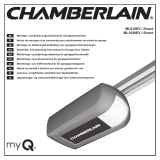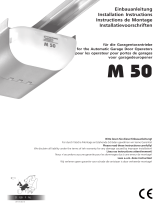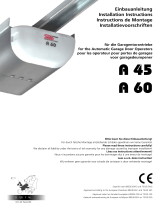
Westfalia Bedienungsanleitung
Nr. 108697

Artikel-Nr.der Anleitung / Article No. of the Manual 21 12 19
NOT-Entriegelung von Außen
Für Garagentoröffner Art. 13 40 31
Artikel Nr. 19 36 07
Additional EMERGENCY Release
For Garage Door Opener Art. 13 40 31
Article No. 19 36 07
Bedienungsanleitung
Instruction Manual

II
Please familiarize yourself with the proper usage of the
device by reading and following each chapter of this manual,
in the order presented. Keep these operating instructions for
further reference.
This operating instruction contains important details for
handling the device. Please pass it on along with the unit if it
is handed over to a third party!
Please read all safety instructions!
These instructions will make it easier for you to handle the
device and help prevent misunderstandings and possible
damage or injury.
Bitte machen Sie sich in der Reihenfolge der Kapitel mit
dem Gerät vertraut und bewahren Sie diese Bedienungsan-
leitung für spätere Zwecke gut auf.
Diese Bedienungsanleitung enthält wichtige Hinweise zur
Inbetriebnahme und Handhabung. Legen Sie die Anleitung
dem Produkt bei, wenn Sie es an Dritte weitergeben!
Bitte lesen Sie alle Sicherheitshinweise!
Diese sollen Ihnen den sachgemäßen Umgang erleichtern
und Ihnen helfen, Missverständnisse und Schäden vorzu-
beugen.
Sehr
g
eehrte Damen und Herren
Content

III
Übersicht
|
Overview
2
1
3
4
5
6
9
7
8

IV
1 Drahtseil Wire
2 Drahtverbinder Wire Connector
3 Sechskantmuttern 2x Hexagon Nuts 2x
4 Buchse mit Außengewinde Socket with Male Thread
5 Schlüssel 2x Keys 2x
6 Zylinderschloss Cylinder Lock
7 Montagewinkel Mounting Bracket
8 Aufsteckhülse Sleeve
9 Unterlegscheibe 2x Washer 2x
Übersicht
|
Overview

1
Safety Notes ........................................................... Page 8
Intended Use........................................................... Page 8
Mounting Conditions ............................................... Page 8
Mounting Diagram................................................... Page 9
Mounting the additional EMERGENCY Release ..... Page 10
Mounting on a door with low material thickness ................. Page 10
Mounting on a door with large material thickness ............... Page 11
Using the additional EMERGENCY Release........... Page 12
Sicherheitshinweise ................................................ Seite 2
Bestimmungsgemäßer Gebrauch ........................... Seite 2
Montagebedingungen ............................................. Seite 2
Montagezeichnung.................................................. Seite 3
Montage der NOT-Entriegelung von Außen............ Seite 4
Montage bei geringer Materialdicke................................. Seite 4
Montage bei großer Materialdicke................................... Seite 5
Benutzung der NOT-Entriegelung........................... Seite 7
Inhaltsverzeichnis
Content

2
Sicherheitshinweise und Monta
g
e
Verfügt die Garage über keinen zusätzlichen Eingang muss
eine zusätzliche NOT-Entriegelung von Außen installiert
werden. Der Garagentoröffner ist ein selbsthemmendes
Gerät und hält das Garagentor verschlossen.
Die NOT-Entriegelung von Außen sollte mehrmals im Jahr
auf ihre Funktionsfähigkeit überprüft werden.
Personen mit eingeschränkten physischen, sensorischen
oder geistigen Fähigkeiten dürfen die NOT-Entriegelung
nicht benutzen, es sei denn, sie werden durch eine Betreu-
erin/einen Betreuer beaufsichtigt und unterwiesen.
Verwenden Sie die NOT-Entriegelung von Außen nicht für
den täglichen Gebrauch zum Öffnen des Garagentores.
Bestimmungsgemäßer Gebrauch
Die NOT-Entriegelung ist für Schwing- und Sektionaltore
geeignet. Sie kann an Garagentoren mit unterschiedlicher
Materialdicke und aus unterschiedlichem Material montieret
werden.
Montagebedingungen
Generell sollte die NOT-Entriegelung mittig ca. 10 – 40 cm
unterhalb der Toroberkanten angebracht werden. Bedingt
durch die große Anzahl von Garagentoren, verfahren Sie bei
der Montage gemäß den Gegebenheiten.
Evtl. können Sie bei alten Garagentoren das Schloss von
innen entfernen und die vorhandene Zylinderöffnung für die
NOT-Entriegelung nutzen. Dies erspart ein zusätzliches
Bohren.
Beachten Sie bitte zur Vermeidung von Fehlfunkti-
onen, Schäden und gesundheitlichen Beeinträchti-
gungen die folgenden Hinweise:

3
Sicherheitshinweise und Monta
g
e
1
2
7
3
4
Um den Einbau bei Garagentoren, die in der Mitte verstärkt
sind zu erleichtern, kann die NOT-Entriegelung auch bis zu
15 cm seitlich versetzt montieret werden.
Bei der Montage von Garagentoren aus Metall sollten Sie die
NOT-Entriegelung so positionieren, dass das Bohrloch durch
die Innenverstärkung des Tores führt.
Montagezeichnung

4
Monta
g
e und Benutzun
g
Montage der NOT-Entriegelung von Außen
Montage bei geringer Materialdicke:
Die Buchse mit Außengewinde (4) der NOT-Entriegelung ist
länger als die jeweilige Gesamtmaterialdicke des Garagen-
tores.
1. Markieren Sie den Einbauort. Die Durchgangsbohrung
sollte 25 mm betragen. Bohren Sie von außen nach innen
ein Loch für die Buchse mit Außengewinde (4).
2. Wickeln Sie das Drahtseil ab und stecken Sie das Seil und
die Buchse von außen in das Garagentor.
3. Bei einer sehr geringen Materialdicke des Garagentores
müssen ggf. eine oder zwei Unterlegscheiben (9) oder die
Aufsteckhülse (8) innen als Abstandshalter auf die Buchse
mit Außengewinde (4) gesteckt werden.
4. Befestigen Sie die Buchse mit beiden Sechskantmuttern (3)
von der Innenseite des Garagentores. Ziehen Sie die
Sechskantmuttern fest an.
5. Schrauben Sie die Schraube am Torarmwinkel (Teil Nr. 13
in der Bedienungsanleitung des Garagentoröffners, Artikel-
Nr. 13 40 31) ab und befestigen Sie den Montagewinkel (7)
mit der Schraube an dem Torarmwinkel. Ziehen Sie die
Schraube fest an.
6. Fädeln Sie das Drahtseil durch die
Öffnung im Montagewinkel. Das Drahtseil
sollte auf dem kürzesten Wege von der
NOT-Entriegelung, über den Montage-
winkel bis hin zum Schlitten geführt wer-
den.
7. Fädeln Sie das Drahtseil durch die
Öffnung im Schlitten, an der NOT-

5
Monta
g
e und Benutzun
g
Entriegelung für innen und verbinden Sie das Drahtseil mit
dem Drahtverbinder (2). Quetschen Sie den Drahtverbinder
mit einer Zange, um das Drahtseil sicher zu befestigen.
Achten Sie darauf, dass das Drahtseil nicht zu straff ge-
spannt ist. Prüfen Sie die Funktion im Testlauf mithilfe einer
zweiten Person. Verlassen Sie die Garage nicht und schie-
ßen Sie die Garage nicht mit dem Garagentoröffner, bevor
Sie sich von der einwandfreien Funktion der NOT-
Entriegelung von Außen überzeugt haben.
Hinweis: Das Drahtseil darf nicht geknickt werden. Stellen
Sie sicher, dass das Garagentor nicht zu fest gegen den
Torrahmen schließt. Durch den hohen Druck auf der Schie-
ne erhöht sich der Kraftbedarf, der für das Entriegeln erfor-
derlich ist.
Montage bei großer Materialdicke:
Die Buchse mit Außengewinde der NOT-Entriegelung ist
kürzer als die jeweilige Gesamtmaterialdicke des Garagento-
res.
1. Markieren Sie den Einbauort. Die Durchgangsbohrung
sollte von außen 25 mm betragen. Bohren Sie von außen
nach innen ein Loch für die Buchse mit Außengewinde (4).
Bohren Sie nun von der Rückseite des Garagentores mit
einer Lochkreissäge ein Loch mit einem Durchmesser von
ca. 55 mm, so dass die Buchse mit Außengewinde gerade
noch herausschaut. Das Loch muss einen Durchmesser
von ca. 55 mm haben, damit Sie die Sechskantmuttern (3)
mit einem Steckschlüssel der Größe 41 mm fest anziehen
können.

6
Monta
g
e und Benutzun
g
2. Verfahren Sie wie unter Punkt 2 „Montage der NOT-
Entriegelung von Außen“. Achten Sie darauf, dass das
Drahtseil nicht zu straff gespannt ist.
Prüfen Sie die Funktion im Testlauf mithilfe einer zweiten
Person. Verlassen Sie die Garage nicht und schießen Sie
die Garage nicht mit dem Garagentoröffner, bevor Sie sich
von der einwandfreien Funktion der NOT-Entriegelung von
Außen überzeugt haben.
Hinweis: Das Drahtseil darf nicht geknickt werden. Stellen
Sie sicher, dass das Garagentor nicht fest gegen den Tor-
rahmen schließt. Durch den hohen Druck auf der Schiene
erhöht sich der Kraftbedarf, der für das Entriegeln erforder-
lich ist.

7
Monta
g
e und Benutzun
g
Benutzung der NOT-Entriegelung
1. Stecken Sie den Schlüssel in den Schließzylinder. Drehen
Sie den Schlüssel nach rechts (im Uhrzeigersinn), um den
Schließzylinder zu entriegeln.
2. Nehmen Sie den Schließzylinder mit
dem Schlüssel aus
der Buchse heraus und ziehen Sie das Drahtseil um die
NOT-Entriegelung zu betätigen. Ziehen Sie nicht
an dem
Schlüssel oder am Schließzylinder. Das Drahtseil zieht die
NOT-Entriegelung für Innen nach unten und entriegelt den
Schlitten. Das Garagentor kann jetzt von Hand geöffnet
werden.
3. Um den Garagentoröffner wieder benutzen zu können,
stecken Sie den Schließzylinder wieder in die Buchse und
verschließen Sie ihn. Ziehen Sie den Schlüssel ab.
4. Zuletzt kontrollieren Sie, ob der Kettenverbinder (siehe
Anleitung 13 40 31 des Garagentoröffners) wieder in den
Schlitten eingehakt ist, bevor Sie wieder den Garagentor-
öffner benutzen!
Überprüfen Sie am besten monatlich alle Verbindungen auf
festen Sitz und die Funktionsfähigkeit der NOT-Ent-
riegelung von Außen.

8
Safet
y
Notes and Mountin
g
If the garage does not have a service entrance door, an
additional outside EMERGENCY release must
be installed.
The garage door opener is equipped with a self-locking
drive and hold the garage door closed.
This emergency release has to be checked several times a
year for proper functionality.
Persons with limited physical, sensorial or mental abilities
are not allowed to use the unit, unless they are supervised
and briefed for their safety by a qualified person.
Do not misuse the EMERGENCY release for everyday use
to open the garage door.
Intended Use
The EMERGENCY release is suitable for one-piece doors and
sectional doors. The accessory can be installed on garage
doors that are made of different material and have different
material thickness.
Mounting Conditions
The EMERGENCY release generally should be positioned in
the centre, approx. 10 – 40 cm below the upper edge of the
door. As a large number of garage door systems are available,
process with installation according to local conditions.
If possible, remove the existing garage door lock and use the
hole for the EMERGENCY release socket. By doing this you
do not need to drill a new hole.
Please note the following safety notes to avoid
malfunctions, damage or physical injury:

9
Safet
y
Notes and Mountin
g
1
2
7
3
4
In order to make installation easier for garage doors that are
reinforced in the centre, the EMERGENCY release can also be
positioned up to 15 cm to the left or to the right.
For mounting on metal doors, position the EMERGENCY
release in such a way that the drill hole leads through the
internal reinforcement of the garage door.
Mounting Diagram

10
Mountin
g
and Usin
g
Mounting the additional EMERGENCY release
Mounting on a door with low material thickness:
The socket with the male thread (4) of the EMERGENCY
release is longer than the thickness of the garage door.
1. Mark the drilling place. The through-hole must be at least
25 mm. Drill the hole from the external side of the garage
door and make sure the socket with the male thread (4) fits
into the hole.
2. Unwind the wire completely and guide the wire together
with the socket from the external side of the garage door.
3. If the material thickness of the garage door is very low, it
may be necessary to insert one or two washers (9) or the
sleeve (8) from the inside on the socket with the male
thread (4). It serves as spacer.
4. Fasten the socket with both hexagon nuts (3) from the
inside of the garage door. Make sure to securely tighten the
hexagon nuts.
5. Unscrew the screw from the door arm bracket (mentioned
as part no. 13 in the manual of the garage door opener,
article no. 13 40 31) and fasten the mounting bracket on the
door arm bracket by using the screw. Make sure to securely
tighten the screw.
6. Guide the wire through the opening in
the mounting bracket. The wire of the
EMERGENCY release must run via the
shortest possible route along the garage
door to the pulley.
7. Slide the wire through the opening in the
pulley, the same hole for the EMER-

11
Mountin
g
and Usin
g
GENCY interior release and connect the wire with the wire
connector (2).
Use pliers and squeeze the wire connector in order to se-
curely fasten the wire.
Make sure not to overtighten the wire. Ask a second person
to assist you while checking functionality. Do not leave the
garage and do not close the garage door with the garage
door opener unless you have tested proper function of the
additional EMERGENCY release.
Hint: Make sure not to bend the wire. Also make sure the
garage door is not touching the garage door frame too tight.
Otherwise the pressure on the frame will be very high and
thus will lead to high power requirement for releasing the
garage door.
Mounting on a door with large material thickness:
The socket with the male thread (4) of the EMERGENCY
release is shorter than the thickness of the garage door.
1. Mark the drilling place. The external through-hole must be
25 mm. Drill the hole from the external side of the garage
door for the socket with the male thread (4). Now drill a hole
with a diameter of approx. 55 mm from the rear side of the
garage door, so the male thread of the socket will be barely
visible. The hole must have a diameter of 55 mm, to be able
to fasten the hexagon nuts (3) with a socket insert of the
size 41 mm.
2. Proceed like described in point 2 in the chapter “Mounting
the additional EMERGENCY release”.
3. Make sure not to overtighten the wire.

12
Mountin
g
and Usin
g
Ask a second person to assist you while checking function-
ality. Do not leave the garage and do not close the garage
door with the garage door opener unless you have tested
proper function of the additional EMERGENCY release.
Hint: Make sure not to bend the wire. Also make sure the
garage door is not touching the garage door frame too tight.
Otherwise the pressure on the frame will be very high and
thus will lead to high power requirement for releasing the
garage door.
Using the additional EMERGENCY Release
1. Insert the key into the locking cylinder. Turn the key to the
right (clockwise) in order to release the locking cylinder.
2. Pull out the locking cylinder and
the key from the socket
and pull on the wire in order to release the EMERGENCY
release. Do not
pull on the key or grasp the locking cylinder.
The wire will pull down the EMERGENCY interior release
and thus will release the pulley. Now the garage door can
be opened by hand.
3. To operate the garage door opener again, first reinsert the
locking cylinder into the socket and lock with the key. Re-
move the key.
4. Finally check whether the chain connector (see manual of
garage door opener, article no. 13 40 31) has engaged into
the pulley before operating the garage door opener again!
We recommend checking every month all components of
the EMERGENCY release for proper fit and functionality.

V
Werter Kunde,
bitte helfen Sie mit, Abfall zu vermeiden.
Sollten Sie sich einmal von diesem Artikel trennen wollen,
so bedenken Sie bitte, dass viele seiner Komponenten aus
wertvollen Rohstoffen bestehen und wiederverwertet
werden können.
Entsorgen Sie ihn daher nicht in die Mülltonne, sondern
führen Sie ihn bitte Ihrer Sammelstelle für Wertstoffe.
Dear Customer,
Please help avoid waste materials.
If you at some point intend to dispose of this article, then
please keep in mind that many of its components consist of
valuable materials, which can be recycled.
Please do not discharge it in the rubbish bin, but check with
your local council for recycling facilities in your area.
Entsor
g
un
g
|
Dis
p
osal

Gestaltung urheberrechtlich geschützt VI © Westfalia 03/10
Kundenbetreuun
g
|
Customer Services
Deutschland Österreich
Westfalia Westfalia
Werkzeugstraße 1 Moosham 31
D-58093 Hagen A-4943 Geinberg OÖ
Telefon: (0180) 5 30 31 32 Telefon: (07723) 4 27 59 54
Telefax: (0180) 5 30 31 30 Telefax: (07723) 4 27 59 23
Internet: www.westfalia.de Internet: www.westfalia-versand.at
Schweiz UK
Westfalia Westfalia
Utzenstorfstraße 39 Freepost RSBS-HXGG-ZJSC
CH-3425 Koppigen 8 Fairfax Road, N. Abbot TQ12 6UD
Telefon: (034) 4 13 80 00 Phone: (0844) 5 57 50 70
Telefax: (034) 4 13 80 01 Fax: (0870) 0 66 41 48
Internet: www.westfalia-versand.ch Internet: www.westfalia.net
-
 1
1
-
 2
2
-
 3
3
-
 4
4
-
 5
5
-
 6
6
-
 7
7
-
 8
8
-
 9
9
-
 10
10
-
 11
11
-
 12
12
-
 13
13
-
 14
14
-
 15
15
-
 16
16
-
 17
17
-
 18
18
-
 19
19
in anderen Sprachen
- English: Westfalia 19 36 07 User manual
Andere Dokumente
-
Schartec Move 1200 Installation And Operating Instructions Manual
-
Schartec Move 1200 Installation And Operating Instructions Manual
-
Schartec Move 1200 Installation And Operating Instructions Manual
-
Chamberlain ML510 Benutzerhandbuch
-
Bauer BelFox Fabia 80 Fitting And Operating Instructions
-
Chamberlain Motorlift ML700 Instructions Manual
-
 Chamberlain Motorlift ML810EV/ML1040EV Bedienungsanleitung
Chamberlain Motorlift ML810EV/ML1040EV Bedienungsanleitung
-
 Seip M50 Installationsanleitung
Seip M50 Installationsanleitung
-
 Seip A-Series Installationsanleitung
Seip A-Series Installationsanleitung
-
Chamberlain ML700 Bedienungsanleitung





















